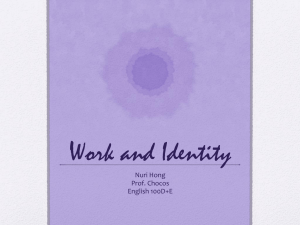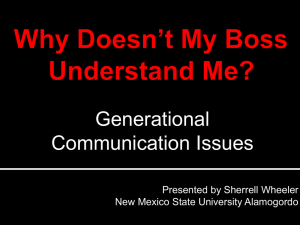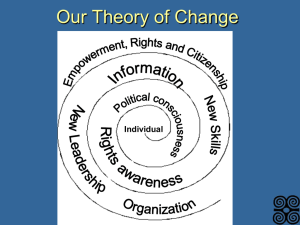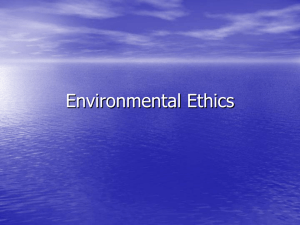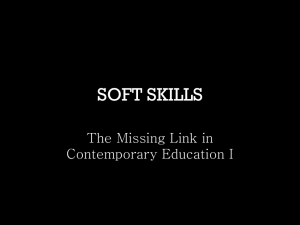2. Biocentrism
advertisement
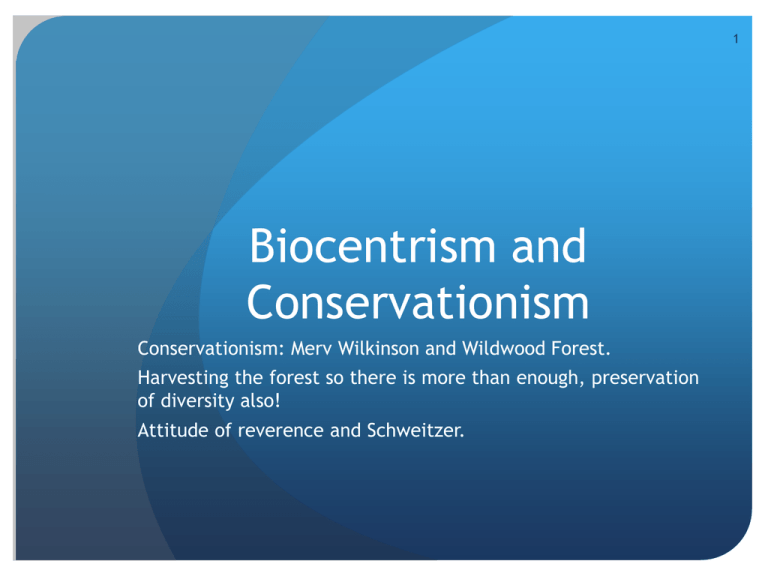
1 Biocentrism and Conservationism Conservationism: Merv Wilkinson and Wildwood Forest. Harvesting the forest so there is more than enough, preservation of diversity also! Attitude of reverence and Schweitzer. 2 Biocentrism “the view that living things as such can benefit from and be harmed by human actions…” Intrinsic value Do harm and benefit entail rights for such things? Opposes anthropocentrism! Is it possible or realistic to universalize reverence and this perspective? 3 Christopher Stone A frightening or laughable proposal that trees, forests, oceans, rivers and other natural objects have legal rights? Historical precedence. Rights based on fact of being harmed by or benefited from human action! Does not imply that they have equal rights, all the same rights as humans have. Legally recognized worth and dignity. 4 Stone and common law Rivers, lakes and forests are rightless, void of rights. No way to challenge polluters except by reference to property. System protects property rights of humans or their economic interests. Yet, it makes sense to speak of legal damage to a natural object. Why? COSTS OF DAMAGE! 5 Current Law Natural objects lack legal standing, unique damages to them do not count and they are not the beneficiaries of rewards. Against conservationism! Why these living things can have standing, if we wish to grant standing: Like legal incompetents, they can makes claims in court. Rights = ability to make claims Guardianship 6 Towards Legal Standing Natural objects become a party to an injunctive settlement, a beneficiary of monetary rewards from recognized harm. Proposes trust fund instead of ending pollution. Allows us to cover homocentric costs among other things. A radical new conception of man’s relationship to nature. The role of attitude and consciousness How realistic is it to have such a radical change? Hegel and the will justifying private property. The absolute right of appropriation over all things! Curing the view that nature is a collection of useful senseless objects! Will love do it? Against mastery, control, does this include “knowledge”? 7 8 The need for a new myth Freeing ourselves from our supportive illusions! Does this imply biocentric equality? A myth to fit our growing body of knowledge of geophysics, biology and the cosmos! Is the modern outlook to blame? What is it? The separation between the normative and the natural, facts and values. Anthropocentrism: natural things have no value independent of our interests and values. 9 Paul Taylor An outlook! 4 assertions. How important are outlooks, ideologies and perspectives in solving environmental problems? Related to Singer’s speciesism. Holism Teleological centers of life 10 Biocentric Egalitarianism IV: Rejection of human superiority. Is this a logically consistent position? Would it be overriding? That is, could it really replace the existing and dominant perspective? Is the rejection itself anthropocentric? Dehumanization! Merv Wilkenson (p. 71) and the alternative. 11 Ecocentrism and Deep Ecology Ecocentrism: idea that ecosystem is the primary moral concern. What is an ecosystem? Is it not a human concept to describe the observation of the energy transfers we find in nature? It is not a relatively closed system. It is open, but has internal and external components. See Wiki! An energy system, the sun. An ecosystem is a community of living organisms (plants, animals and microbes) in conjunction with the nonliving components of their environment (things like air, water and mineral soil), interacting as a system.[2] 12 The Land Ethic: Leopold Extension of ethics is “actually a process in ecological evolution.” 80 An ethic: “a limitation on the freedom of action in the struggle for existence.” 80 Actually, a replacement of “original freedom for all competition” by cooperative mechanisms, an ethical content. Consistent? A brief history of ethics The Land Ethic: An Evolutionary Possibility He regards it as a ecological necessity. The single premise of all ethical systems: individual is member of a community of interdependent parts. Really? Implies integration, but what about racism, classism, inequality, discrimination, segregation? Land Ethic: simply enlarges the boundaries of the community to include soil, water, plants and animals. Land Ethic cannot prevent existing uses of “natural resources.” (81) 13 14 An Ethic of Respect Changes role for homo sapiens, from conqueror to plain member The Judao-Christian Tradition: Land given to humans to be fruitful and multiply State of current conservationism: encourages only enlightened self-interest The modern farmer: anxious for quick success The profit motive? 15 The Land Ethic Starting point: a change in ethics to include obligations to the land, to the ecosystem as a whole Problem is rooted in our attitudes and motives: loyalties, convictions, mind frames The economic motive; problem is that most members of the land community have no economic value What is this due to? Song birds, a good example; economic reason to valid protection 16 The Land Ethic Hence, it opposes the economic valuation of members of the biotic community in favor of a limit on our actions based on inclusion into this community Preservationism– the view that certain species have a right to exist and even thrive within reason Ecosystem “needs” these species (beech tree for soil fertility) and hence we should preserve them Does need entail obligation? 17 Land Ethic The existing government forumula: relegate conservation of such things and systems to government Parks, refuges, monuments The assumed lack of profit has been wrong Does this open the economic route? No disapproval of government trustee of land But goal is assigning more obligations to the private landowner 18 Land Ethic Private property and landowners They show no sign of voluntarily using conservationism Lack of ethical obligations to the land, or only a personal ethic No system of conservationism based on economic self interest will include all elements of the land community False assumption: economic parts can function without the non-economic ones Only visible remedy: an ethical obligation on part of private landowners 19 Land Ethic: The Land Pyramid A description of dependency of life on the soil. Food chains, etc. Crucial aspect is that it is open and changeable but knowing how ecology works is vital for knowing whether are actions are good or not Some biota are relatively robust and resistant, Western Europe, some are not, South America Changes do not necessarily divert the flower of energy In general, the more violent or rapid the change, the worse 20 Land Ethic Use of land and violence. How do we determine the degree of violence? Formulating an ethic: ecological conscience and aim of land health Health as capacity for self-renewal p.88: keylog of the land ethic : “ quit thinking about decent land use as solely an economic problem. Examine each question in terms of what is ethically and aesthetically right...” “A thing is right when it tends to preserve the integrity, stability and beauty of the biotic community. It is wrong when it tends otherwise.” 88 21 Williston’s interpretation a and b on page 90 a) not interfering in such balanced systems to the degree that damages the energy flow b) rectifying whatever damage to such systems our actions have already produced by restoring them to something resembling their pre-interference state Not prevented from changing them: feeding the Moose? Preservationism: maintaining integrity of ecosystems. Preservation against destructive human activity. Applied to national parks, Banfff, example of elk and wolves 22 Applying Land Ethic Is this case an instance of the violence of mere human presence? Is human population such violence? Evolution! 23 Deep Ecology Some basics: A radical movement seeking change at a deep, fundamental level Emerged out of plenty and prosperity, the higher or middle class, the richest industrial societies Environmentalism as a privileged movement! The Concept: going deeper than ecology? Transcends limits of any particular science A philosophy, hence an attempt at an environmental philosophy/ethic 24 Deep Ecology A movement, a social/political one follows from the philosophy Sharing of some of the principles but not a uniform movement Naess’ Ecosophy T! Implies individuality of such a philosophy. Personal? Individuated, not homogeneous Attempt to formulate a wisdom not a knowledge or science from the movement 25 Deep Ecology and Self Realization Which Self? Idea of broad, enlarged Self Based on principle of identification in a positive sense Inspired by Eastern thought--Buddhism Process of ever-widening “identification” A reply to alienation, social? 26 Deep Ecology and Identification Identification is spontaneous and the deeper it goes the more the difference and separation of ego and alter (other) dissolves Does not eliminate individual differences or conflicts Vital interests! Growing, flourishing, etc. Generates problems of priority 27 Identification Fellow feeling, empathy The Self is one, is in all things Higher level of unity or oneness Opposes alienation, which can engender hatred of self, against self Non-reciprocal, does not impose obligations on the other The idea of Atman (yogi, enlightened one, etc) Western tradition-- Spinoza and acting out of the self 28 D.E. and Identification Process of further widening of Self through self-seeking, knowing the self Results in understanding of how all things and beings are interconnected, sharing in “Self.” Should increase action, activity for the purpose of enlarging the self No need for altruism, but maturity Maturation as realization of potential, self-realization Voluntary simplicity and joy 29 Widening of Self Widening and increasing perspectives, deepening experiences, higher levels of activeness Opposes Kantian duty Acting out of identification of suffering! Suffering most potent source of identification Beautifying actions Romanticism and idea of “man apart” 30 Intrinsic Value and Flourishing Raising of consciousness, Rachel Carlson and her work “Silent Spring.” Self awareness. More appreciation of non-industrialized cultures and minorities, too much bordering on adulation? Criticism of progress in industrial society The call for intrinsic value related to these two Identification: Every living being has a right to life! 31 Deep Ecology and Attitude of Love Love as capable of creating restraints!

